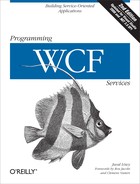- Programming WCF Services, Second Edition
- Dedication
- A Note Regarding Supplemental Files
- Forewords
- Preface
- 1. WCF Essentials
- What Is WCF?
- Services
- Addresses
- Contracts
- Hosting
- Bindings
- Endpoints
- Metadata Exchange
- Client-Side Programming
- Programmatic Versus Administrative Configuration
- WCF Architecture
- Working with Channels
- Transport-Level Sessions
- Reliability
- 2. Service Contracts
- 3. Data Contracts
- 4. Instance Management
- Behaviors
- Per-Call Services
- Per-Session Services
- Singleton Service
- Demarcating Operations
- Instance Deactivation
- Durable Services
- Throttling
- 5. Operations
- 6. Faults
- 7. Transactions
- The Recovery Challenge
- Transactions
- Transaction Propagation
- Transaction Protocols and Managers
- The Transaction Class
- Transactional Service Programming
- Explicit Transaction Programming
- Service State Management
- Instance Management and Transactions
- Callbacks
- 8. Concurrency Management
- Instance Management and Concurrency
- Service Concurrency Modes
- Instances and Concurrent Access
- Resources and Services
- Resource Synchronization Context
- Service Synchronization Context
- Custom Service Synchronization Contexts
- Callbacks and Client Safety
- Callbacks and Synchronization Contexts
- Asynchronous Calls
- 9. Queued Services
- 10. Security
- Authentication
- Authorization
- Transfer Security
- Identity Management
- Overall Policy
- Scenario-Driven Approach
- Intranet Application Scenario
- Internet Application Scenario
- Business-to-Business Application Scenario
- Anonymous Application Scenario
- No Security Scenario
- Scenarios Summary
- Declarative Security Framework
- Security Auditing
- A. Introduction to Service-Orientation
- B. Headers and Contexts
- C. Publish-Subscribe Service
- D. Code-Access Security
- E. Generic Interceptor
- F. WCF Coding Standard
- G. ServiceModelEx Catalog
- CollectionExtensions
- ArrayExtensions
- AppDomainHost
- InProcFactory
- ServiceHost<T>
- MetadataHelper
- DataContractSerializer<T>
- DataTableHelper
- ServiceThrottleHelper
- IInstanceStore<ID,T>
- FileInstanceStore<ID,T>, FilePersistenceProvider, FilePersistenceProviderFactory
- MemoryProvider, MemoryProviderFactory
- TransactionalMemoryStore<ID,T>, TransactionalMemoryProvider, TransactionalMemoryProviderFactory
- TransactionalInstanceStore<ID,T>, TransactionalInstanceProvider, TransactionalInstanceProviderFactory
- InstanceContext<T>, DuplexClientBase<T,C>, DuplexChannelFactory<T,C>
- WsDualProxyHelperCallbackBaseAddressBehaviorAttribute
- DebugHelper
- ErrorHandlerHelper
- ErrorHandlerBehaviorAttribute, CallbackErrorHandlerBehaviorAttribute
- ILogbookManager, LogbookManagerClient, LogbookManager
- BindingRequirementAttribute
- ResourceManager, TransactionalLock
- Transactional<T>
- TransactionalCollection<C,T>
- TransactionalArray<T>, TransactionalDictionary<K,T>, TransactionalLinkedList<T>, TransactionalList<T>, TransactionalQueue<T>, TransactionalSortedDictionary<K,T>, Tr
- TransactionalBehaviorAttribute
- FormHost<F>
- SafeButton, SafeLabel, SafeListBox, SafeProgressBar, SafeStatusBar, SafeTextBox, SafeTrackBar
- ThreadPoolSynchronizer, ThreadPoolBehaviorAttribute, CallbackThreadPoolBehaviorAttribute, ThreadPoolHelper
- AffinitySynchronizer, ThreadAffinityBehaviorAttribute, CallbackThreadAffinityBehaviorAttribute, HostThreadAffinity
- PrioritySynchronizer, PriorityClientBase<T>, PriorityContext, PriorityCallsBehaviorAttribute
- QueuedServiceHelper
- ResponseClientBase<T>, ResponseScope<T>, ResponseContext
- CredentialsManager, AspNetSqlProviderService
- SecureClientBase<T>, SecureDuplexClientBase<T,C>, SecurityBehaviorAttribute, SecurityHelper, ServiceSecurity
- HeaderClientBase<T,H>, GenericContext<T>
- ContextClientBase<T>, ContextManager
- NetNamedPipeContextBinding, NetNamedPipeContextBindingElement, NetNamedPipeContextBindingCollectionElement
- PersistentSubscriptionServiceClient, IPersistentSubscriptionService, ISubscriptionService, PersistentSubscription, PublishService<T>, SubscriptionManager<T>, PersistentSubscriptionManager
- PartialTrustClientBase<T>, PartialTrustDuplexClientBase<T,C>, CodeAccessSecurityHelper
- GenericInvoker, OperationInterceptorBehaviorAttribute, ServiceInterceptorBehaviorAttribute
- InterceptorClientBase<T>
- SecurityCallFrame, SecurityCallStack, SecurityCallStackContext, SecurityCallStackClientBase<T>, SecurityCallStackInterceptor, OperationSecurityCallStackAttribute, SecurityCallStackBehaviorAttrib
- Index
- About the Author
- Colophon
- Copyright
On the client, always verify that the queue (and a dead-letter queue, when applicable) is available before calling the queued service. Use
QueuedServiceHelper.VerifyQueues( )for this purpose.Always verify that the queue is available when hosting a queued service (this is done automatically by
ServiceHost<T>).Except in isolated scenarios, avoid designing the same service to work both queued and non-queued.
The service should participate in the playback transaction.
When participating in the playback transaction, avoid lengthy processing in the queued service.
When using a singleton queued service, use a volatile resource manager to manage the singleton state.
When using a per-call queued service, explicitly configure the contract and the service to be per-call and sessionless:
[ServiceContract(SessionMode = SessionMode.
NotAllowed)] interface IMyContract {...} [ServiceBehavior(InstanceContextMode = InstanceContextMode.PerCall)] class MyService : IMyContract {...}Always explicitly set contracts on a queued singleton to disallow sessions:
[ServiceContract(SessionMode = SessionMode.
NotAllowed)] interface IMyContract {...} [ServiceBehavior(InstanceContextMode = InstanceContextMode.Single)] class MyService : IMyContract {...}The client should call a queued service inside a transaction.
On the client side, do not store a queued service proxy in a member variable.
Avoid relatively short values of
TimeToLive, as they negate the justification for a queued service.Avoid nontransactional queues.
When using a response queue, have the service participate in the playback transaction and queue the response in that transaction.
Have the response service participate in the response playback transaction.
Avoid lengthy processing in a queued response operation.
With MSMQ 3.0, prefer a response service to a poison queue service dealing with failures of the service itself.
With MSMQ 4.0, use
ReceiveErrorHandling.Rejectfor poison messages unless you have advanced processing withReceiveErrorHandling.Move. AvoidReceiveErrorHandling.FaultandReceiveErrorHandling.Drop.With MSMQ 4.0, consider the use of a response service to handle service playback failures.
Unless dealing with a sessionful contract and service, never assume the order of queued calls.
-
No Comment
